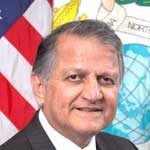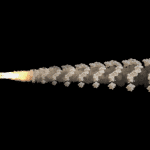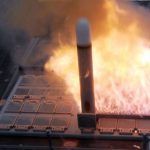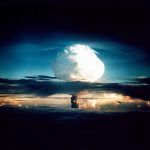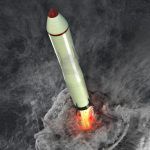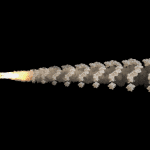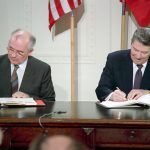Dealing with Putin’s grand strategy: The impossibility of “bromance”
By Ehsan M. Ahrari | April 24, 2017
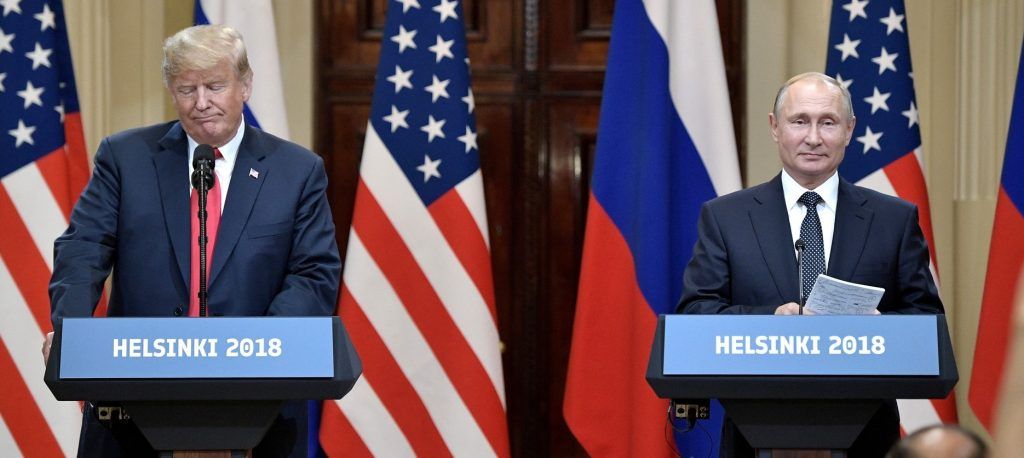 Credit: Kremlin.ru
Credit: Kremlin.ru
Because Russian President Vladimir Putin considers the implosion of the former Soviet Union to be “the greatest geopolitical tragedy of the 20th century,” the grand strategy of his foreign policy has been to restore the Soviet Union’s past glory and superpower status to Russia. Former US President Barack Obama, on the contrary, did not share Putin’s notion of grand strategy. He placed Putin’s aggressive behavior toward Ukraine and its carving up of Crimea in one box, and Russia’s presence and influence in Syria in an entirely different box. But because these two theaters of operation are interlinked in Putin’s strategy, and his handling of them is aimed at placing his country in the central arena of Great Power maneuverings, no solution to either conflict is possible without Russia’s active participation—and recognition of its central role.
Donald Trump is a very different president than Obama. Like Putin, Trump has an exaggerated sense of his own importance and capabilities. The “greatness” that Trump ascribes to himself and to America is not all that different from Putin’s grand strategy.
These similarities, coupled with some public expressions of mutual respect, have raised expectations about a Trump-Putin “bromance” and what it might mean for nuclear weapons negotiations, especially now that the United States is conducting its first Nuclear Posture Review under the Trump presidency. However, it is likely that the relationship will change as Trump grows into his job. To deal effectively with Putin, Trump will have to develop a better understanding of the complexity inherent in modern conflicts.
Putin’s grand strategy. As the former director of the FSB (Russia’s Federal Security Service), Putin focused on strengthening his country’s status as a security state—in which the FSB is considered “the new nobility”—and then using it in the global arena in a variety of ways. However, that decision did not mean that he would only use military power abroad to pursue Russian interests. On the contrary, “hybrid warfare”—which mixes conventional warfare with unconventional tactics such as cyberwarfare—plays a crucial role in Putin’s approach. The chief purpose of this multifaceted strategy is to push the United States as far as possible without creating a military conflict.
Thus, in the case of Ukraine, Putin felt comfortable enough to carve up Crimea—knowing that, since Ukraine is not part of NATO, the United States would not go to war in retaliation. Similarly, Putin continues to destabilize Ukraine by using his unacknowledged army of “little green men,” but would not threaten the sovereignty of that country through an outright invasion.
In Syria, Putin is using different tactics. To save the Syrian regime from a US air campaign during the Obama presidency, Putin suggested that the United States let Syrian president Bashar al-Assad give up his chemical weapons. Putin then used his own air power to ensure the survival of the Assad regime by destroying the US-sponsored “moderate” Islamist groups. Since the Obama administration had remained skeptical of the loyalty of those groups, Putin calculated that he could bomb them into oblivion without incurring America’s wrath.
The world took note of the crucial role that Russia, Iran, and Turkey played as major powers in the Syrian conflict, to the exclusion of the United States. Arab leaders, who admire and understand the ruling styles of autocrats, are likely to gather around Putin, while Donald Trump is still learning the ABCs of America’s global strategic objectives and how to pursue them.
Russia’s hacking of the US presidential election of 2016 perfectly highlighted Putin’s aspirations to be viewed as a global influencer, one who allegedly favored Trump over Hillary Clinton. Being depicted as a person who could manipulate America’s presidential elections in such a big way added a lot of clout to Putin’s persona as Russia’s leader.
The Trump doctrine. Donald Trump has been critical of the conventional leadership role of the United States in the globalized world. He wanted to eliminate burdensome expenses related to that leadership, including global military alliances—especially NATO. He rightly criticized the lopsided nature of this alliance, in which the United States has borne the brunt of expenditures, while its allies have been “free-riders.” Trump has been equally critical of the triple alliance system of the United States, Japan, and South Korea in East Asia—and even threatened to withdraw from it, if those countries “didn’t take further steps to defend themselves.” His overall solution to these uneven arrangements is to continue only those arrangements that are not harming the economic well-being (the “greatness”) of the United States.
Trump’s voluble criticism of America’s conventional role in the world’s affairs captured Putin’s attention. Given the fact that the Democratic Party’s presidential nominee, Hillary Clinton, was quintessentially from the post-Cold War era and promised to continue the overall foreign policy of President Barack Obama, Putin quickly developed a fondness for Trump.
Putin knew that Trump’s preference for less involvement in global affairs was an opportunity for Russia to gain stature. Putin not only preferred Trump’s candidacy, but also made his preference known to the world through the global media.
Two huge egos. Will the globally touted (and tweeted) “bromance” between the two “most powerful men in the world” last? These are two heads of state whose traits make them believe that they can achieve great things and solve problems of any magnitude by themselves. These very same qualities might mean that their gigantic egos are bound to clash in the coming months or years, as the strategic interests of their respective states collide.
In his July 2016 acceptance speech for the nomination of his party, Trump “did not appeal to prayer, or to God,” as Yoni Appelbaum noted in The Atlantic. “He did not ask Americans to measure him against their values, or to hold him responsible for living up to them. He did not ask for their help. He asked them to place their faith in him.”
Similarly, Putin radiates enormous self-confidence in his ability to give Russia the global status and prestige of a superpower. Joseph Burgo, writing in The Atlantic in 2014, observed that “Putin’s apparent desire to reunite former Soviet republics could suggest he harbors fantasies of unlimited power,” and that his invasion of Ukraine could be seen as the move of a man who feels he’s entitled to have what he wants.
Now Putin is busy updating his grand strategy, to deal with Trump. The hardened Cold Warrior may have to add a few new features to his methods for dealing with the United States.
He knows that the United States has never taken the durability of its global primacy for granted. It recalibrates its economic, informational, diplomatic, and military aspects in different regions of the world on a continual basis.
Putin knows that he must remain nimble in calculating his own next moves with the new US president by using his idiosyncratic quietness and his time-tested purposeful ambiguity. Putin is also cognizant of the fact that Russia is not likely to become one of the world’s foremost economic powers any time soon, and certainly not a power with military strength superior to that of the United States.
Despite that awareness, in his dealings with leaders of various great powers—and especially with the United States—Putin never creates the slightest impression that Russia is a has-been. As long as he remains president of the Russian Federation, Putin will assert, with utmost boldness, that Russia remains an active, major player in the global power arena.
On-the-job learning. Trump’s chief strength is that he is unpredictable. That unpredictability will regularly keep Putin on his toes, in order to correctly calculate his own responses to the mercurial “Trump mindset”—characterized by energy, momentum, and focus—on numerous issues of global significance.
Putin knows how much flattery pleases Trump. However, Putin is also adroit and crafty enough to know that it is just a matter of time until Trump learns the significance of sustaining America’s primacy and influence around the world, and becomes immune to Putin’s calculated adulations.
Despite all the campaign bluster about “America First,” Trump has been growing into the American presidency, simplistically described as the world’s “most powerful job.” Purely in the military sense, it may be. However, with presidential powers also come enormous complexities, checks and balances, and the necessity of learning about highly intricate policy issues—and how to exercise presidential powers on those issues.
The best description of presidential powers comes from Richard Neustadt, who wrote that the power of the president is the power to persuade. However, this persuasion has to be based on an unambiguous comprehension of the complexities of foreign and domestic policy issues. What Trump quickly learned is that America’s strategic presence and influence in Syria has been damaged because of Obama’s reluctance to exercise his country’s enormous military power. Trump’s attack on Syria may be viewed as his way of reversing that damage.
When chemical weapons were used in Syria to attack civilians, Trump reacted quickly, surprising the world and especially Vladimir Putin. With Trump’s authorization, the United States reacted swiftly by bombing the air base from which the chemical weapons were launched. Who actually used those weapons remains a source of controversy, but the United States has no doubt about who was ultimately responsible. Assad and Putin, on the other hand, blamed the US-backed Islamists as the real culprits. Whether Russia approved the use of chemical weapons remains in contention.
Bromance or breakup? The result of the Syrian air strike is that the Putin-Trump bromance has been badly damaged. It has not yet broken, but its future does not appear too bright.
The driving force for the United States is its proclivity for remaining a global leader through the exercise of economic power and global diplomacy—and, when necessary, its awesome military prowess. The combination of what political scientist Joseph Nye called “smart power”—a combination of soft and hard power—guarantees America’s global leadership. This is a principle that goes beyond who is sitting in the White House. President Trump has already started the process of learning and internalizing the necessities of pursuing America’s historical penchants for remaining a global leader.
One important litmus test of the anticipated thaw in US-Russia relations is whether Putin will offer major concessions to Trump in the realm of nuclear modernization, as a quid pro quo for Trump’s anticipated lifting of economic sanctions on Russia. Even before the US military attacks on Syria, the Pentagon stated that Russia was violating the Intermediate-Range Nuclear Treaty of 1987 by secretly deploying a new cruise missile. In the aftermath of the US air attacks on Syria, Russia froze an agreement that was aimed at preventing accidents between US and Russian aircraft carrying out various bombing missions in the Syrian airspace. As the New York Times reported, Russia also announced that “it would bolster Syria’s air defense systems, and was reported to be planning to send a frigate into the Mediterranean Sea to visit the logistics base at the Syrian port of Tartus.” Given these developments, the chances of any meaningful cooperation from Putin on nuclear issues are not good.
The world is already witnessing a possible end to the Trump-Putin bromance, as the 45th US president is fast learning the nuances of his job. The fact that Trump has, however equivocally, stated that he no longer considers NATO “obsolete” was another disappointment for Putin. The United States is not about to part company with policies that Russia finds even mildly annoying. On all big issues, there are likely to be more downs than ups in the Russia relationship in the coming years.
Russia wants to be a superpower once again, but the United States has no interest in facilitating Russia’s aspirations, because such a potential is viewed as harmful by major power players inside the United States. Although Trump is a major player himself, his strength stems not only from the power of the presidency, but also from his fervent and unabashed self-promotion—which mirrors Putin’s role on the Russian side. The same brutal power realities that raised expectations about a bromance also serve as major impediments to cooperation.
The United States’ relations with Russia and China are supposed to be competitive by nature. Such competition does not allow the emergence of bromance between the heads of states, no matter who is the president of the United States or Russia.
Together, we make the world safer.
The Bulletin elevates expert voices above the noise. But as an independent nonprofit organization, our operations depend on the support of readers like you. Help us continue to deliver quality journalism that holds leaders accountable. Your support of our work at any level is important. In return, we promise our coverage will be understandable, influential, vigilant, solution-oriented, and fair-minded. Together we can make a difference.
Share: [addthis tool="addthis_inline_share_toolbox"]
